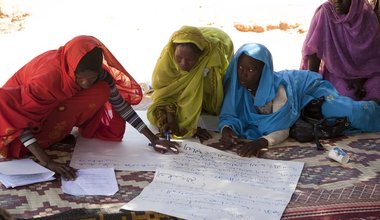UN agencies, UNAMID hold dialogue on protection mechanisms for women
 The African Union - United Nations Mission in Darfur (UNAMID), in collaboration with UN agencies in the region, organized on 19 December a community dialogue on physical protection in Zam-Zam camp for internally displaced persons (IDPs), North Darfur. The event geared towards raising women’s awareness on issues related to gender-based violence, which would protect them against abuses in their communities.
The African Union - United Nations Mission in Darfur (UNAMID), in collaboration with UN agencies in the region, organized on 19 December a community dialogue on physical protection in Zam-Zam camp for internally displaced persons (IDPs), North Darfur. The event geared towards raising women’s awareness on issues related to gender-based violence, which would protect them against abuses in their communities.
The forum, which was attended by hundreds of IDP women and men, representatives of the UN High Commissioner for Refugees (UNHCR), the UN Population Fund (UNFPA) and UNAMID, provided a platform for interactive and constructive discussions on issues affecting women in the camp.
Speaking at the event, a UNAMID representative, Silvester Kuhudzai, said that the dialogue was designed to create an integrated gender perspective and to respond to the specific needs of the residents of the camp, especially the women and children, and to draw up recommendations that will enhance UNAMID’s protection mechanisms.
Among the recommendations, the participants proposed additional UNAMID protection patrols, especially during livelihood activities, the enhancement of rule of law in the camp, the increase of health facilities for women and children and the provision of trainings for midwives.
UNAMID is mandated to work on issues related to women, peace and security, which are guided by a number of UN Security Council resolutions to protect and promote women’s rights, create an enabling environment in Darfur for the promotion of gender justice, respond to and mitigate gender-based violence and enhance women’s participation in the peace process and decision-making.
 UN
UN United Nations Peacekeeping
United Nations Peacekeeping


